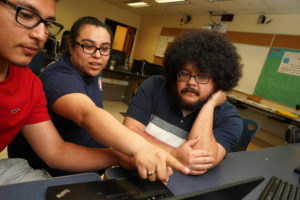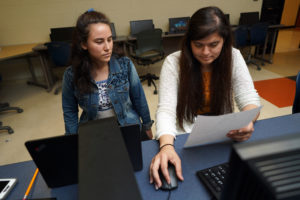Kevin was quiet and withdrawn when he first came to GED class at James Monroe High School. The 17-year-old left his homeland behind last year to make a better life for himself in the United States. It was an arduous journey, and not speaking English and working full time without a high school diploma made the transition even more difficult. Huddled over his desk, not speaking or making eye contact, he wasn’t ready to open up to anyone.

That is, until he met Salma Sandoval ’20. One evening, the UMW junior, who was tutoring the GED students, approached Kevin and asked him where he was from.
“He said he was from Guatemala, and I shared that I was, too,” said Sandoval, who is majoring in international affairs, Spanish and Latin American studies. “We bonded over what we missed about the country and what his life was like before he came to the United States. I think that’s why he feels so comfortable with me. We’ve shared similar experiences.”
This semester, Sandoval and seniors Marlen Reyes and Natalie Florez are participating in a program called Exito Mentors as part of a UMW class called Culture of Service and Social Action in the Hispanic World. According to Spanish Professor Elizabeth Lewis, who teaches the course, the high school reached out to Mary Washington because the GED students are primarily Spanish speakers and the teachers needed support in the classroom. Twice a week, the UMW students spend their evenings helping local teens prepare for the GED test, which is offered in both English and Spanish.
The student mentors’ efforts haven’t gone unnoticed.
In fact, Tristen Mimiaga and Jonathan Doblix, the JMHS teachers who run the program, said the Mary Washington tutors have had a tremendous impact on the 13 students, who take practice tests in math, science, language arts and social studies in preparation for the actual test. While his students are extremely motivated, Mimiaga said that seeing three successful college-educated Latinas giving back to the Hispanic community inspires them to work toward their own goals.
On a recent evening, Florez and Reyes helped Kevin with los números primos y compuestos, or prime and composite numbers. He can identify them easily but struggles to explain why he came to a particular answer.
An international development major, Florez said they use different strategies to learn what works for each individual student. “We don’t want them to be dependent upon us for the right answer. We want them to think critically and analyze a problem so they can figure it out on their own.”
Kevin said he struggled to remember what he was taught at first. But the teachers and UMW students showed him a more hands-on, interactive way of learning using Khan Academy, a computer program that offers practice tests in Spanish. “Now, with the way I’m being taught, I’m not forgetting the concepts.”

A Spanish major, Reyes said she relates to the students because she learned English as a child after emigrating from Mexico. But she also recognizes the privilege that comes with being a college student. “As a little girl, I learned at the same pace as my classmates. But adults have obligations and challenges, such as working and caring for families, which can make learning more difficult.”
Florez said the program has familiarized her with the hardships that immigrants and non-native English speakers endure. She feels that she and the other students are in a unique position to help.
“As members of the Hispanic community, we have personal experiences with those struggles,” Florez said. “Our parents made those choices, and now we are pursuing higher education. Their efforts paid off.”
The Exito Mentors program is not the only partnership between UMW and Fredericksburg City Public Schools that helps Spanish-speaking youth become more confident in their learning.
“I want them to be proud of learning a new language and of being bilingual,” said Associate Professor Marίa Laura Bocaz-Leiva, about the ESL students at Lafayette Upper Elementary School. Her Intensive Writing students exchanged letters with the children throughout the semester as part of the Pen Pals program. Bocaz-Leiva and her students also introduced Toma mi Mano/Hold my Hand at Hugh Mercer Elementary School. The program has UMW students helping kindergartners and other new students find their classrooms, cafeteria and school buses.
In addition to giving UMW students the opportunity to practice their language skills, Bocaz-Leiva hopes these programs will set Spanish-speaking youth on a path toward higher education by helping them see that attending college is a real possibility.
“This is a concrete way of saying we at UMW value diversity. We have the human and economic resources to help. If we are able to work together, we all win.”